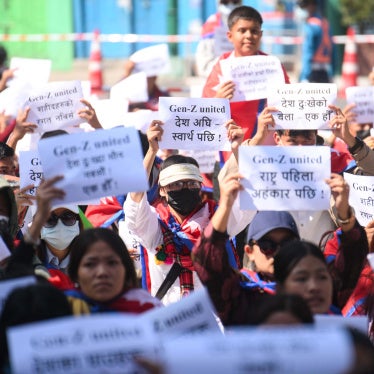Conscript soldiers in Russia performing their first year of compulsory military service are routinely denied adequate food and access to medical care, Human Rights Watch said in
a report released today.
The average Russian soldier is sick and hungry,” said Rachel Denber, acting executive director of the Europe and Central Asia division of Human Rights Watch. “Yet, the Russian government fails to even acknowledge the problem, let alone address it.”
On November 17, the U.N. Committee on Economic, Social and Cultural Rights will scrutinize Russia’s record on economic, social and cultural rights, including the rights to adequate food and health care.
The 40-page report, “To Serve Without Health: Inadequate Nutrition and Health Care in the Russian Armed Forces,” details how conscripts are deprived of adequate food. The diet of conscripts often lacks meat and green vegetables, and falls short of the Russian military’s own nutritional standard for soldiers. The food they do receive is often of poor quality, rotten, or bug-infested. The hazing system that has made Russia’s military notorious also prevents junior conscripts from getting enough to eat, as senior conscripts confiscate younger conscripts’ most desirable food.
Violent hazing in the military also discourages many first-year conscripts from seeking medical care for minor health problems, as they fear repercussions from senior conscripts. In some cases senior soldiers harass and beat conscripts after they seek medical care. In others, conscripts’ commanding officers and even doctors deny conscripts’ requests for medical care.
In some dramatic cases, this treatment has led to the death of conscripts or permanently damaged their health. For example, Viacheslav Turov, a nineteen-year-old conscript from the Siberian city of Novokuznetsk, died in 2001 from complications of double pneumonia after only three and a half months in the military. Early in his service, he had complained about losing seven kilograms in just a few weeks because of an inadequate diet. The post-mortem report identified malnutrition as having contributed to his death.
Violent hazing continues in many on-base sickbays and in some military hospitals, where senior soldiers beat or otherwise ill-treat first-years, or force them under threat of abuse to perform a variety of humiliating chores. In at least one case, the victim committed suicide after a night of particularly cruel treatment.
Human Rights Watch calls on the Russian government to take the following steps to stop these abuses:
- Restore the effectiveness of enforcement mechanisms set out in the Code of Military Conduct aimed at ensuring that soldiers receive an adequate diet, monitoring their health,and ensuring effective access to health services when necessary.
- Conduct investigations to determine why existing enforcement mechanisms are not effective.
- Institute mechanisms to ensure the protection of soldiers’ rights; hold accountable all officers and lower ranking personnel who infringe upon any soldier’s right to adequate food or health care, or who interfere with state and military mechanisms to protect and enforce those rights.
- Establish a permanent monitoring mechanism, possibly by creating an ombudsman for military servicemen, to ensure the existing standards are consistently and appropriately implemented.
- Ratify the European Social Charter.






